Arthrokinematics - Study guides, Class notes & Summaries
Looking for the best study guides, study notes and summaries about Arthrokinematics? On this page you'll find 233 study documents about Arthrokinematics.
Page 4 out of 233 results
Sort by
![PRACTICE TEST NASM 101 QUESTIONS [100% Correct Answers]](/docpics/5267348/663f7a34d7fe5_5267348_121_171.jpeg)
-
PRACTICE TEST NASM 101 QUESTIONS [100% Correct Answers]
- Exam (elaborations) • 18 pages • 2024
- Available in package deal
-
- $9.59
- + learn more
PRACTICE TEST NASM 101 QUESTIONS [100% Correct Answers] The Golgi tendon organ is an essential component of static stretching because it *Ans* Prevents muscle from being placed under excessive tension What is the correct force-couple relationship that allows for the upward rotation of the scapula? *Ans* Upper trapezius and lower portions of the serratus anterior Deoxygenated blood is pumped from the right ventricle to the lungs through? *Ans* pulmonary arteries Dynamic stretching impr...
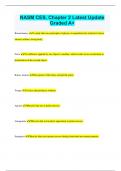
-
NASM CES, Chapter 2 Latest Update Graded A+
- Exam (elaborations) • 5 pages • 2024
- Available in package deal
-
- $8.99
- + learn more
NASM CES, Chapter 2 Latest Update Graded A+ Biomechanics A study that uses principles of physics to quantitatively study how forces interact within a living body. Force An influence applied by one object to another, which results in an acceleration or deceleration of the second object. Rotary motion Movement of the bones around the joints. Torque A force that produces rotation. Agonist Muscles that act as prime movers. Antagonists Muscles that act in direct opposition to p...
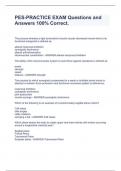
-
PES-PRACTICE EXAM Questions and Answers 100% Correct.
- Exam (elaborations) • 18 pages • 2023
- Available in package deal
-
- $11.49
- + learn more
The process whereby a tight (overactive) muscle causes decreased neural drive to its functional antagonist is defined as: altered reciprocal inhibition synergistic dominance altered arthrokinematics intramuscular coordination - ANSWER-altered reciprocal inhibition The ability of the neuromuscular system to exert force against resistance is defined as: power strength speed balance - ANSWER-strength The process by which synergists compensate for a weak or inhibited prime mover in...
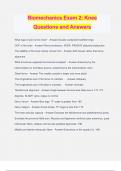
-
Biomechanics Exam 2: Knee Questions and Answers
- Exam (elaborations) • 15 pages • 2024
-
- $12.49
- + learn more
Biomechanics Exam 2: Knee Questions and Answers What type of joint is the knee? - Answer-Double condyloid/modified hinge DOF of the knee - Answer-Flexion/extension, IR/ER, PASSIVE abduction/adduction The stability of the knee mainly comes from - Answer-Soft tissues rather than bony alignment What structures separate the femoral condyles? - Answer-Anteriorly by the intercondylar (or trochlear) groove, posteriorly by the intercondylar notch Distal femur - Answer-The medial condyle is large...
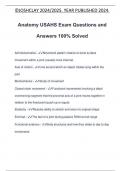
-
Anatomy USAHS Exam Questions and Answers 100% Solved
- Exam (elaborations) • 15 pages • 2024
-
- $11.49
- + learn more
Anatomy USAHS Exam Questions and Answers 100% Solved Arthrokinematics - Movement pattern relative to bone surface movement within a joint (usually more internal) Axis of motion - Line around which an object rotates lying within the joint Biomechanics - Study of movement Closed chain movement - Functional movements involving a distal (nonmoving) segment that the proximal axis of a joint moves together in relation to the fixed point (push up or squat) Elasticity - Muscles ability to stre...
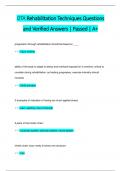
-
OTA Rehabilitation Techniques Questions and Verified Answers | Passed | A+
- Exam (elaborations) • 8 pages • 2024
- Available in package deal
-
- $10.19
- + learn more
progression through rehabilitation should be based on ____ : injury healing ability of the body to adapt to stress and overload imposed on it overtime; critical to consider during rehabilitation; as healing progresses, exercise intensity should increase : SAID principle 3 examples of indication of having too much applied stress: : pain, swelling, loss of strength 3 parts of the kinetic chain: : muscular system, articular system, neural system kinetic chain injury rarely involves one ...
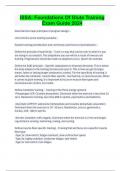
-
ISSA: Foundations Of Glute Training Exam Guide 2024
- Exam (elaborations) • 7 pages • 2024
-
Available in package deal
-
- $11.99
- + learn more
Describe the major principles of program design: - List common acute training variables: - Explain training periodization and commonly used forms of periodization: - Define the principle of specificity: - Train in a way that carries over to what it is you are trying to accomplish. The adapations you see will be a result of how you are training. Progressions should be made as adaptions occur. Sports for example. Define the SAID principle: - Specific adaptations to imposed demands. ...
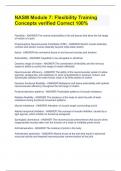
-
NASM Module 7: Flexibility Training Concepts verified Correct 100%
- Exam (elaborations) • 8 pages • 2024
-
- $10.99
- + learn more
Flexibility - ANSWER The normal extensibility of all soft tissues that allow the full range of motion of a joint Proprioceptive Neuromuscular Facilitation (PNF) - ANSWER Stretch muscle statically, contract and stretch muscle statically beyond initial static stretch fascia - ANSWER the connective tissue in and around muscles and tendons Extensibility - ANSWER Capability to be elongated or stretched Dynamic range of motion - ANSWER The combination of flexibility and the nervous system...
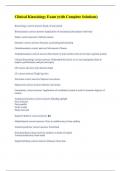
-
Clinical Kinesiology Exam (with Complete Solutions)
- Exam (elaborations) • 14 pages • 2023
-
Available in package deal
-
- $10.99
- + learn more
Kinesiology correct answers Study of movement Biomechanics correct answers Application of mechanical principles to the body Statics correct answers Uniform motion Dynamic correct answers Systems accelerating/decelerating Osteokinematics correct answers Movement of bones Arthrokinematics correct answers Movement of joint surface relevant to body segment motion Clinical kinesiology correct answers Understand the forces so we can manipulate them to improve performance and prevent ...
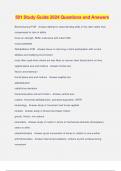
-
501 Study Guide 2024 Questions and Answers
- Exam (elaborations) • 14 pages • 2024
-
- $12.49
- + learn more
501 Study Guide 2024 Questions and Answers Biomechanical FOR - Answer-attempt to restor/develop skills in the client rather than compensate for lack of ability focus on strength, ROM, endurance with intact CNS musculoskeletal Rehabilitative FOR - Answer-focus on returning a client participation with current abilities and modifying environment most often used when clients are less likely to recover client factors/short on time sagittal plane axis and motions - Answer-frontal axis flexion...

How did he do that? By selling his study resources on Stuvia. Try it yourself! Discover all about earning on Stuvia


